“I discovered Marria Pratts at La Miró. Later I saw an installation at the Macba and found her at Arco. Her ghost and material spontaneity are so iconic –explains the artistic director of the Liceu, Víctor García de Gomar– that you immediately recognize them … Each time he struck me in the same way. His work is a pictorial spectralism that now, for the first time, at the Liceu, has become sculpture.”
This is how De Gomar defends his current assignment to a plastic artist to occupy the Saló dels Miralls. I commission one of the great Catalan names of the future with a personality to match his work. His spontaneous creations, with their uninhibited aura, are also sold by the handful.
The multidisciplinary artist, born in Barcelona in 1988 and resident in l’Hospitalet de Llobregat, where the neighbors take her for a painter of walls because of her baggy clothes stained with paint – “I prefer not to make them mistaken” –, has created for the Liceu, which is his first sculptural group, a discipline in which he makes his debut as a “leap into the void”, if what it is about is following the motto of the high school season.
It is a sardana of ghosts, those recurring ghosts in his work that in this case shake a cultural institution that wonders about the opera of the future… while imagining that of Florence in 1600, where plastic artists shone.
“I thought that doing painting would be confusing in this already overloaded room, and I wanted to do a fight, a dance, a sardana of three, to the minimum”, the artist tells La Vanguardia. And in pink, the color that obsesses him. Her father provoked her by telling her that he would buy her a pink t-shirt, “and now she is coming out for me –she laughs–, I see that I have to invoke her. In addition, I like to take it out of the context of him and take it to other imaginaries ”.
The sculpture, 1 sardana, 3 ghosts, made of iron inflated with water that is then emptied, torn and hit, unconsciously drinks from tradition. “Yes, in rituals we unconsciously believe. I have never danced a sardana but it is like a dance that is already established. And you wonder about the limits of the symbols, about how they mix. I consider myself very non-traditional, I’m not even baptized. But there was a moment, during the execution of the work, that was for me like a baptism, because when it is built it fills with water, it explodes and ends up looking like a fountain, because it gradually deforms due to the vacuum that the water generates at pressure. In the end it was like a dysphoria of tradition: I was baptized dancing a sardana!”, he laughs.
I had never been to the Liceu. “I didn’t go to the University either and this year they invited me to give a class… I went in for the first time and it was to give the talk.” In the Liceu she entered from the back, seeing everything fake, it was like being inside an organ, she warns. “The Liceu carries an almost biological load and I don’t like to start from prejudices… I asked for a ticket for Don Giovanni and, oh my gosh, I didn’t understand anything, not how they spoke, or anything. Opera is a very dense language… ”.
Marria likes to observe, the contemplation of the street, the walks. “This is where things come from,” she says. Where does it come from to change her name by reinforcing the R and the T? “It’s love for mistakes, for me it’s like embracing a mistake every day. Institutions mess with that and I think it generates movement, it takes you out of the established and everyday.”
How did a person like her spend her childhood? He has a hard memory of that stage. Her mother died when she was five years old and… “I was aware that what was happening to me was not sweet. The school, with the other children with their parents, ‘look how handsome’, I just wanted it to happen now” .
The path of art has been therapeutic for her. “At first I didn’t let go of the free stroke, it wasn’t sweet at all and I was aware that it wasn’t. But I don’t like to talk about it. That strengthened my brother and me. And surely if it hadn’t been like that I wouldn’t have dedicated myself to this”.
When he found out that he was doing something for the Liceu, people asked him… “aren’t you afraid?” “And no, what’s up, I’m not afraid of anything, I’ve already lost everything, I’ve hit rock bottom. Now everything seems beautiful to me, I’m grateful to be well. My mother died just when she was 34, the age I am now. So I experienced it as a tragedy, because our culture lives death that way. Now it is different, I know there is a continuity, a presence. In addition, she made experimental cinema and I have all her films there to see. Waiting to have the criteria to do so”.








